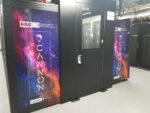In this video from SC19, Scott Yokel from FASRC describes Cannon, Harvard University’s first liquid-Cooled supercomputer. Developed in cooperation with Intel and Lenovo, the new system’s advanced supercomputing infrastructure will enable discoveries into areas such earthquake forecasting, predicting the spread of disease, and star formation. “With the increased compute performance and faster processing of the Cannon cluster, our researchers now have the opportunity to try something in their data experiment, fail, and try again. Allowing failure to be an option makes our researchers more competitive.”
Harvard Names New Lenovo HPC Cluster after Astronomer Annie Jump Cannon
Harvard has deployed a liquid-cooled supercomputer from Lenovo at it’s FASRC computing center. The system, named “Cannon” in honor of astronomer Annie Jump Cannon, is a large-scale HPC cluster supporting scientific modeling and simulation for thousands of Harvard researchers. “This new cluster will have 30,000 cores of Intel 8268 “Cascade Lake” processors. Each node will have 48 cores and 192 GB of RAM.”





